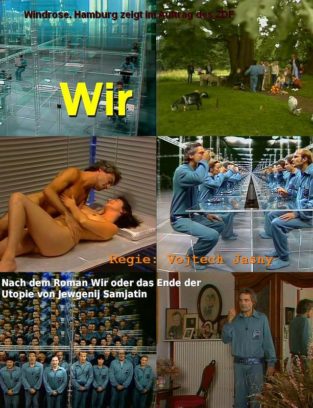 The future: following the catastrophic “Sixty Minutes War” civilization has become a sterile and mechanized drudge within dreary interior settings. The residents of this “advanced” society are identified by numbers and collectivity is prized above all else. Everyone has to glorify the “One State” and its “Benefactor,” and rail against past eras, when people were grouped into “microscopic, eternally warring states called family.”
The future: following the catastrophic “Sixty Minutes War” civilization has become a sterile and mechanized drudge within dreary interior settings. The residents of this “advanced” society are identified by numbers and collectivity is prized above all else. Everyone has to glorify the “One State” and its “Benefactor,” and rail against past eras, when people were grouped into “microscopic, eternally warring states called family.”
This is the world of Yevgeny Zamyatin’s classic Russian novel WE, completed in 1921 but not published in its native land until 1988 (following an English language translation in 1924 and a New York published Russian language edition in 1952). An admitted influence on George Orwell’s 1984, WE is often cited as the “grandfather” of futuristic dystopias.
This 1982 made-for-German-television adaptation was directed by the veteran Czech helmer Vojtech Jasny (of the bizarre kid flicks WHEN THE CAT COMES and THE GREAT LAND OF SMALL). It’s an extremely faithful transposition for the most part, capturing both the intellectual vigor and the prophetic satire (one character extolls the “immortal tragedy” of something called “He Who Was late to Work”) of Zamyatin’s text.
The protagonist is D-503 (Dieter Laser), the builder of a One State sanctioned rocket called the Integral. He delights in the ultra-regulated society in which he lives, and constantly sings its praises. But one day D-503 visits an “ancient” 20th Century house with 1-330 (Sabine von Maydell), a female mathematician to whom D-503 finds himself attracted. She apparently feels the same way, as a few days later she “registers” him—i.e. issues an official summons for him to have sex with her.
D-503 goes through with the act, but after it’s over he learns some unpleasant facts about 1-330. It seems she’s a troublemaker who likes to drink, smoke and question the official doctrine. Worse, her ideas come to infect D-503, causing him to develop a soul—a strict no-no in this world. One day he follows 1-330 into a closet inside the ancient house, which leads to a corridor that deposits D-503 in an outdoor region of trees and sunlight. There 1-330 is working to ferment a revolution with the help of forest-dwelling outsiders, and plans to use the Integral to affect that revolution.
From there, of course, D-503 finds it very hard to return to his regimented indoor existence. He grows sickly and uncertain of his place in this apparent utopia, and is summoned for a face-to-face meeting with the Benefactor himself. This fails to cure D-503 of his heretical ideas, and so he’s subjected to torture.
The novel continued on from this point to include descriptions of wide scale mayhem and destruction, which didn’t make it into the film. It works fine as it is, though, distinguished by once-innovative blue screen effects, with actors performing before plainly unreal backgrounds that more often than not consist of endlessly repeating mirror images. This was a technique popular in seventies-era TV movies from Europe and Asia, although WIR stands out in that category due to its highly mobile (if noticeably wobbly) camerawork (most European sci fi TV movies of the time tended to be visualized in staticy wide shots).
Other notable elements include the creepy organ muzak score, much surprisingly explicit sex and nudity, and a strong central performance by the always-game Dieter Laser (best known on these shores for THE HUMAN CENTIPEDE).
Inevitably, a number of anachronisms pop up throughout WIR (such as the fact that the citizens of this technologically advanced society still use pen and paper to make their records), which, in common with its source novel, is not what you’d call exciting or action-packed. It is fascinating, though, for those unafraid of complex thought. Plus it’s proven undeniably prophetic—note the line of dialogue “Walls are the greatest of man’s inventions,” a quote that had a very definite meaning in early-1980s Germany but has quite a different, though equally pertinent, one in post-2016 America.
Vital Statistics
WIR (WE)
Windrose/GmbH
Director: Vojtech Jasny
Screenplay: Claus Hubalek
(Based on a novel by Yevgeni Zamyatin)
Cinematography: Martin Straub, Norbert Zinkand
Editing: Nicolaus Richter
Cast: Dieter Laser, Sabine von Maydell, Gert Haucke, Joachim Dietmar Mues, Susanne Altschul, Giovanni Fruh, Wolfgang Kaven, Dieter G. Knichel, Kurt Lambrigger, Marga Massberg, Heinz Moogy, Hanna Ruess
